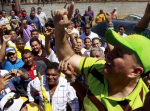Venezuela
Published on Thu, 2017-08-03 09:29
The measures adopted by the Venezuelan government, in the context of the election of the Constituent Assembly and protests by those who question it, further aggravated the human rights situation in that country. On July 30, the government again responded with violence to demonstrations against it. On this occasion, ten people died, raising the number of people killed in protest situations to 119 in the last four months. According to investigations by the Public Prosecutor’s Office, a considerable percentage of these deaths resulted from shots fired by police and military officials. Other deaths are due to the actions of armed civilian groups that respond both to sectors of the opposition that propose an insurrectionary response and to para-state groups. In situations of protest, the state response must be based on the principle of protecting life; this emanates from states’ international human rights obligations. |
Published on Fri, 2013-06-14 00:00
The achievements in the fight against poverty that income statistics attribute to the government of Venezuela since 1999 are overshadowed by violence and insecurity that impede the full exercise of the rights to education, health, recreation and enjoyment of public spaces. Constitutional and legal reforms since 2008 represent another setback following the progress of basic rights in the first presidency of Hugo Chavez, by centralizing political power, restricting participation and democratic freedoms and pluralism, and increasing militarization of society. At the same time, the authorities insist on the criminalization of social protest and human rights. The significant decline in poverty began during the administrations of President Chavez but stagnated in his second term (2007-2013). The reduction, which had been 16.4% between 2004 and 2006, was only 1.8% in the next four years. |
|
Los logros en la lucha contra la pobreza que las estadísticas por ingreso atribuyen al gobierno de Venezuela desde 1999 se ven opacados por la violencia y la inseguridad, que impiden el ejercicio pleno de los derechos a la educación, a la salud, al esparcimiento y al goce de los espacios públicos. Las reformas constitucionales y legales que se han sucedido desde 2008 suponen otro retroceso tras los avances de los derechos básicos en el primer periodo de Hugo Chávez en la presidencia, al centralizar el poder político, restringir la participación y las libertades democráticas y el pluralismo, y aumentar la militarización de la sociedad. Al mismo tiempo, las autoridades insisten con la criminalización de la protesta social.
|
| Source: . Published on Thu, 2012-04-12 10:32 |
|
Source: . Published on Tue, 2012-01-24 08:01
JUAN FRANCISCO ALONSO | EL UNIVERSAL |
|
Source: . Published on Fri, 2012-01-20 11:55
MARINO ALVARADO B. |
|
The economic model pursued under the Government of President Chávez bears the stamp of neoliberalism and is in fact a continuation and expansion of resource extraction. It has had serious negative environmental consequences and has proved unable to meet people’s needs. There has been some improvement in education but other areas of basic rights like health and housing have regressed. Social development programmes have been cancelled or neglected and the Government, which disdains dialogue with the opposition or with critical civil society organizations, is weakening democracy by implementing far-reaching changes to the 1999 Constitution. The country needs to design a development model that is genuinely sustainable.
|
|
Source: . Published on Tue, 2010-09-28 00:00
» |
|
After an economic bonanza that lasted from 2004 to 2008 – based on high oil prices on the international market – Government social policies led to improved indicators, and the Millennium Development Goals were on the official agenda and were widely discussed. Today, the global financial crisis and increased social unrest caused by weakening social programmes have put this progress at risk. This was only to be expected from a development model that repeated the same old mistakes and did not include anti-cyclical policies, and today the country is having to pay dearly for the world crisis.
|
|
In the midst of sharp political polarization, discussion regarding the impact on the country of the international economic crisis has been postponed. A series of plans promoted by the Government attempt to ensure food security as well as universal access to health, housing and education. However, there have been complications involving the distribution of food, cutbacks in health plans and an insufficient response to the demand for housing. Results come closest to those hoped for in education.
|
SUSCRIBE TO OUR NEWSLETTER








